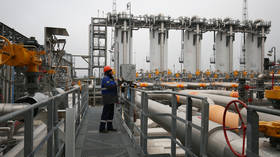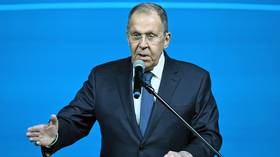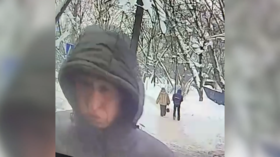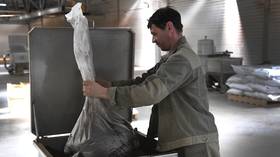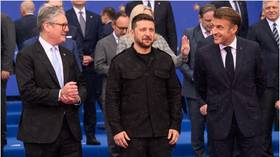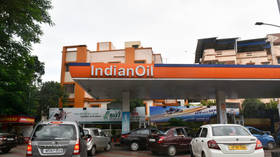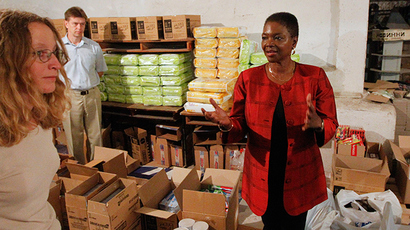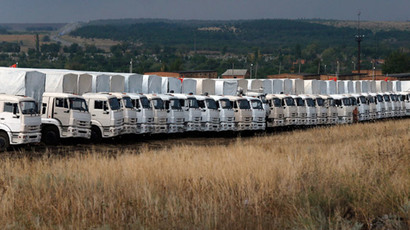Russia’s 2nd Ukraine aid convoy of 200 trucks arrives in Lugansk
All 200 trucks in Russia’s 2nd convoy carrying humanitarian aid for devastated areas of eastern Ukraine have arrived in the city of Lugansk after weeks of delays that occurred despite an agreement on relief corridors in the Minsk ceasefire deal.
Six of the nine trucks carrying medicines have been unloaded, RIA Novosti reports.
Lugansk residents will start receiving the aid on Monday.
“Now the humanitarian aid has been received and we thank the Russian Federation for help in these difficult times. The humanitarian aid will be distributed on Monday,” said the leaders of the self-proclaimed Lugansk People’s Republic.
Ukrainian customs officers refused to inspect the convoy together with their Russian counterparts when given the chance, said Nikolay Sinitsyn, a representative of the Russian Interior Ministry in the Rostov region, southwest Russia.
He added that Ukrainian soldiers were standing nearby while Russian officials were checking the aid.
“We would like to note that nobody impeded the work of the Ukrainian side. The officials from the OSCE were working at the site,” he added.
Earlier it was reported that all 200 trucks had crossed the border.
“At 08:00 Moscow time (04:00 GMT) the customs procedures for all trucks and goods in them were completed,” local customs service spokesman Rayan Farukshin told RIA Novosti news agency.
The trucks started passing through Russia’s ‘Donetsk’ checkpoint into the buffer zone shortly before midnight on Friday. Trucks had to wait for several hours to get clearance for further movement from Russian customs officers supervised by their Ukrainian colleagues.
The 200 white Kamaz trucks were waiting for their turn to undergo customs proceedings, as the first group moved into Ukrainian territory early on Saturday morning.
Along the route of the convoy, the members of the self-proclaimed republic’s defense forces are ensuring its safety, Itar-Tass reports. Besides that, the convoy that moves toward Lugansk at around 60 kilometers per hour is escorted by road police vehicles.
Residents of war-ravaged eastern Ukraine are living for many weeks on the brink of a humanitarian catastrophe. The aid delivery is crucial as parts of the country remain blocked by government troops limiting food supplies, while the infrastructure destroyed in shellings left the residents of Lugansk without electricity and drinking water.
This is the second Russian shipment of humanitarian relief for Ukraine, and just like with the first shipment of goods, the Ukrainian authorities are being over-scrupulous in letting the aid in, keeping it at the border. The aid delivery has been delayed because Kiev did not fulfill the preliminary plan coordinated with Russia three weeks ago, Stepanov said. “We've been waiting for Kiev's response,” he said on Thursday.
He described the convoy as carrying about 2,000 tons of foods, medicine, water purification equipment, and power generators and other consignments, all donations from various regions of Russia.

The International Committee of the Red Cross (ICRC) – which accompanied the first Russian shipment of humanitarian aid to Ukraine – is not attending the second, ICRC spokeswoman Anastasia Isyuk told Itar-Tass. “The ICRC has never been officially notified of the agreement between Russia and Ukraine on the achievement of the technical arrangements for this convoy,” she said. “Consequently, the ICRC is not involved in assisting in the delivery of goods.”
The first convoy delivered aid to Ukraine on August 22. A week later, foreign ministers of Russia and Ukraine, Sergey Lavrov and Pavel Klimkin, respectively, agreed to send the residents of Donetsk and Lugansk regions a new batch of humanitarian aid.
“We are very grateful to the Russian Federation for providing us with aid,” the prime minister of the LPR self-proclaimed republic, Gennady Tsypkalov, said Friday, adding that residents of the troubled region are currently in a “critical” situation.
On September 5, a ceasefire agreement was reached during talks in Minsk between Ukrainian government representatives and republic leaders. The peace plan, based on Russian President Vladimir Putin's proposals, calls for an “all to all” prisoners of war exchange, hardware withdrawal and humanitarian aid access to the area.



